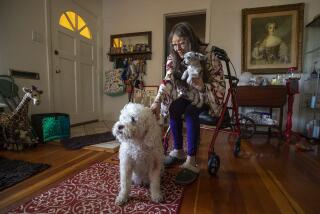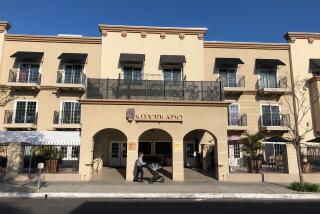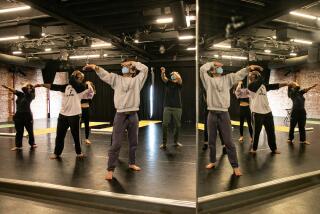Retirement home for Hollywood vets has a unique strategy for keeping seniors safe from COVID-19
Chair yoga had concluded, but before the call-in trivia game show could begin, Bob Beitcher had a critical message for the 227 residents of his retirement community.
âStay the ... home,â the generally well-mannered chief executive of the Motion Picture and Television Fund urged over the campusâ closed-circuit television station.
The Woodland Hills colony â which has accommodations for both independent living and long-term care â had already been under shelter-in-place orders for nearly a month. Hospitality staff had been delivering meals directly to residentsâ doors, communal gatherings were canceled and essential employees were receiving daily thermal scans.
Still, Beitcher was running into people breaking the rules. Heâd just crossed paths with a resident who was picking up a prescription at the CVS across the street and ran into another who had gone to the bank â even though âwe had told them 20 times: âWe have someone who can do these things for you.ââ
So during his thrice-weekly live address to the senior citizens â broadcast on MPTFâs Channel 22 â Beitcher decided it was time to get stern.
âI told them I never thought Iâd say this, and to close their ears if they didnât want to hear the language,â he said, referring to his F-bomb. âCompliance has been the No. 1 issue here. I donât think itâs that people are irrationally noncompliant â itâs 87 years of going to get your mail and talking to your friends, and itâs not easy to break out of that habit if youâve been stuck in your room and run into a bunch of people.â
Following the rules is particularly vital at MPTF, where already 16 residents have been diagnosed with COVID-19 and another three, including actor Allen Garfield and longtime Disney animator Ann Sullivan, have died from it. Elderly citizens with underlying health conditions are at greater risk for contracting the coronavirus, and more than 120 nursing and communal living facilities in Los Angeles County are already dealing with infections. On Tuesday, L.A. County public health director Dr. Barbara Ferrer even suggested it would be âperfectly appropriateâ to move loved ones out of such locations to maintain their health.
But beyond maintaining the physical well-being of its inhabitants, MPTF has also been particularly concerned about residentsâ mental health. Which is why, shortly after the campus went into lockdown, Jennifer Clymer â who runs Channel 22 â suggested using the television station as a way to forge ongoing social connections.
Since its inception in 2006, Channel 22 has offered round-the-clock programming to MPTF, and about half of its content is created by those on campus. The offerings include weekly announcements, an interview series highlighting the industry backstories of residents, short films and black-box sketches. Clymer entertains every pitch and does her âutmost to say yes to everything,â though she frequently has to tell would-be political contributors to start a YouTube channel instead of sharing their issue-driven views on the station. (MPTF is a donation-driven organization, and Clymer is careful to avoid programming that would alienate potential donors.)
When the novel coronavirus began to sweep through Southern California, Clymer suggested that Channel 22 pivot to live streaming three days a week, eight hours a day.
âMy question was, if we have to make sure people are physically distancing, how do we make sure they are still socially connecting?â Clymer recalled. âHow do we make it so that people are still getting the information that people are getting from Channel 22 and understand their creative voice is still valid even though they canât physically be near one another? Regardless of bingo being canceled and their standard poker game being held off, the people they are usually interacting with are still there.â
Clymerâs first thought was to take normal weekday activities and broadcast them to the residents â things like exercise or meditation classes that would easily translate. She and her co-workers â Channel 22 employs five full-time staffers and one part-time employee â decided to convert a campus screening room into a live studio and broadcast from the theater while maintaining six feet of physical distance. Thereâs no hair and makeup, and a microphone boom is being used in place of lavaliers. Guests arrive by themselves to film, like Beitcher, who uses his time to address residents and answer call-in questions.
âWhat Iâve tried to do is to communicate whatâs going on on campus and be totally transparent,â the chief executive said. âTheyâre staying in their rooms, so most of them arenât experiencing the measures weâre taking to keep everyone safe. And I want them to know whatâs going on in the world. I describe driving to work and what I see and I donât see on Montana Avenue. I talk about my long walk on the bike path on Saturdays. Iâm trying to keep them as in touch with the world as they knew it as possible.â
Because many at MPTF have professional industry experience, Clymer said, a handful of residents have editing software on their computers that allows them to continue to create content from their homes. But she and her staff have also been placing instructional calls to those with phones or laptops and teaching them how to install Zoom. For those who donât have cameras embedded in their personal technology, Channel 22 has six iPads that theyâve been lending out encased in a rubberized cover that is easier to disinfect.
Harry Northup, a 79-year-old actor who appeared in films including âMean Streetsâ and âTaxi Driver,â had been an active participant in Channel 22âs programming before the quarantine. In 2018, he put together a Walt Whitman poetry reading and got off-campus friend Robert Forster to participate. So when Clymer suggested he continue contributing in the age of coronavirus, he was quick to adapt, learning Zoom from home.
âWhatâs happened to me â and I think a lot of us â is that this coronavirus has just yanked us into the future,â said Northup, who moved to MPTF two years ago with his late wife. âSelf-isolation and the self-distancing â that gets to me. Before this happened, we would eat three meals together and always talk about shows. Now weâre told to stay a distance away from people. But Iâm fine as long as I keep being involved creatively, and I think this does help people communicate and keep in touch.â
To keep his mind active, Northup decided to create another poetry segment from home. He selected 15 of Robert Frostâs poems, wrote up a quick biography of the poet and teamed with another actor on campus, Brett Hadley, to appear with him on the broadcast.
âAfter it aired, I felt the same as I did as working on a good day. It just lifts me up and exalts me,â Northup said. âEvery time you turn on the TV, there are facts about how to deal with COVID-19. And thatâs fine. But for me, you still need that creativity that will lift you up through whatever youâre going through.â
Clymer, meanwhile, has been soliciting âDigital Angel Cardsâ â short video messages that outsiders can send in to let the residents know theyâre being thought of. So far, sheâs collected shout-outs from the likes of Steve Guttenberg, Tony Goldwyn and Yvette Nicole Brown.
Dr. Scott Kaiser, MPTFâs practicing geriatrician and chief innovation officer, said itâs important for the public to be mindful of how loneliness and isolation are affecting older community members.
âIn the long term, we know that people who are chronically isolated have higher stress responses, more inflammation, higher blood pressures and even premature death,â Kaiser explained. âBut when it comes to older people, those particular impacts are just more significant and the stakes are a lot higher.â
Sandy Bollinger, 77, has come to rely heavily on MPTFâs social community. She moved to the campus because her husband, publicist Henri Bollinger, was then in his 80s and needed more constant care. When he died six months after arriving at MPTF, his widow was urged by her friends to leave.
âBut I never had to go to a support group because I was surrounded by people here who had gone through what I had gone through,â she said. One of her strongest ties to the community has been the Grey Quill Society, a writing group she joined that is currently gathering via Zoom on Channel 22.
Thatâs part of why Clymer feels such an obligation to keep the live broadcast running. She admitted that at times sheâs been particularly high-strung with her co-workers about disinfecting practices around the studio because she doesnât want anyone to fall ill.
âWe are providing a little bit of a life raft for people that feel like theyâre on their own,â said Clymer, who has been poking fun at herself on TV too, pulling out a wardrobe rack of ridiculous clothing and allowing residents to call in and tell her which item to try on.
Phil Gittelman, 82, hasnât participated in the dress-up game yet. But because of his passion for dining â he normally has a Channel 22 show called âThe Original Foodieâ â he has called in to do a live chat with one of the owners of Musso and Frank Grill. Still, he acknowledged: âItâs been a very challenging time.â
âTheyâve been firm about staying in your room, and thatâs very difficult for me,â said Gittelman, who used to manage actors including Craig T. Nelson and Tony Dow. âI find myself sitting outside in the sun and making sure no one is close to me, or walking around the square. Iâve got to get out and about, but I wonât go across the street â thatâs foolish. And Iâm glad Bob is telling people that; I emailed him accordingly. All it takes is one wrong move.â
More to Read
The biggest entertainment stories
Get our big stories about Hollywood, film, television, music, arts, culture and more right in your inbox as soon as they publish.
You may occasionally receive promotional content from the Los Angeles Times.











